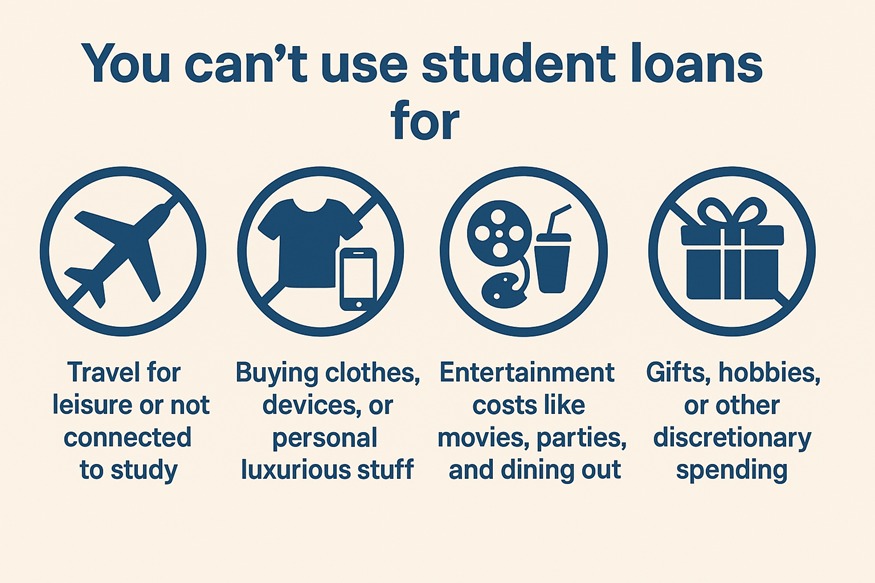Expenses Covered Under Education Loan

- Types of Expenses That Can Be Covered by Education Loans
- Does An Education Loan Cover Living Expenses?
- Eligibility Criteria And Coverage Limits For Living Expenses in Education Loans
- Advantages of Choosing Hero FinCorp Education Loan for Expenses
- Finance Your Education Easily With Hero FinCorp
- Frequently Asked Questions
Education costs are rising fast.
Tuition and related expenses have been increasing at 11–12%, doubling roughly every six to seven years. And when you plan to study further, tuition is only one part of the total cost. You also need to budget for food, travel, accommodation, and other living expenses.
Does an education loan cover all of this?
Let’s break down the types of expenses included, along with eligibility criteria and common coverage caps.
Types of Expenses That Can Be Covered by Education Loans

When you start outlining the expenses for higher education, the list quickly becomes extensive. But an education loan helps ease the burden. It covers many of the expenses, making it simple to plan and finance your education easily.
Here are the expenses covered by an education loan:
Tuition And Academic Fees
Tuition and academic fees constitute a major portion of education costs. An education loan helps you cover all the related expenses for lectures, seminars, assessments, and other institution-specific services.
Rent And Accommodation Fees (Hostel/Private Housing)
Most colleges offer on-campus housing for holistic learning. Plus, if you are relocating, you will need a place to stay if your institution does not offer on-campus housing. Education loans extend the coverage to accommodation and hostel charges, mess charges, and security deposits, so you need not worry about accommodation charges.
Some lenders require proof of accommodation to cover these expenses.
Transportation Costs (Local And International Travel)
An education loan also offers coverage for travel-related expenses for your education. It includes travelling to the study destination or commuting from your stay to the institution.
Utilities And Household Supplies
It covers the essentials you need to stay in your study destination. It includes:
- Electricity bills
- Water bills
- Purchasing household supplies
- Food and grocery
Also Read: What Is a Utility Bill? Types, Examples, and Importance
Health Insurance And Medical Expenses (Where Applicable)
Most institutions abroad require students to have health insurance before they move to the country. To account for this, education loans also offer coverage for health insurance and medical expenses.
Miscellaneous Personal Expenses
Many other expenses are not covered by your tuition fees or utilities and are covered by an education loan.
Here's a list:
- Books, equipment, and study material
- Field visits
- Trips
- Project work expenses
- Internet charges
Manage your finances wisely to ensure your spending stays within the approved coverage limits. You can also use a loan EMI calculator to estimate your monthly payments and plan your budget better.
Does An Education Loan Cover Living Expenses?
Yes, an education loan covers living expenses, but the extent varies as per the lender.
If you live on campus, an education loan covers living expenses up to the institution's cost of attendance (COA). COA is the estimated cost of attending college, including tuition, accommodation, textbooks, and other related expenses.

Whether you live on campus or off campus, here's a list of living expenses covered under the education loan:
- Rent
- Transportation
- Food and groceries
- Housing supplies and utilities
- Furniture
- Stationery and textbooks
- Laptop and education software
- Health and medical coverage
Also Read: Traveling Home for the Festival? How Is a Short-Term Personal Loan Helpful?
Eligibility Criteria And Coverage Limits For Living Expenses in Education Loans
It is advisable to go through the eligibility criteria very closely before applying for an instant education loan so as not to face any delays or rejection. The main applicant (parent or working professional) must be aware of the principal requirements for the successful and quick application process.
Here are the key eligibility requirements to review:
- Be between 21 and 58 years of age
- Be an Indian citizen
- Have 2 years of self-employed experience or 6 months of job experience
- Minimum monthly income of Rs. 15000
You also need supporting documents, which vary by lender. Here's a list:
- Proof of admission
- Documents supporting living expenses
- Consistent academic performance
- KYC documents
- Academic certificates, including marksheets and a passing certificate
Looking for clarity on coverage caps and eligibility? Download the personal loan app and review the terms to understand exactly what your education loan includes.
Also Read: How Can I Get Education Loan: A Complete Guide
Advantages of Choosing Hero FinCorp Education Loan for Expenses
Over 90% of students pay out of pocket due to inadequate financial support and unfair fee structures.
Hero Fincorp helps students and their families manage educational expenses without this stress.
- A quick digital process through the instant loan app that takes just 10 minutes
- No heavy paperwork, guarantor, or collateral
- Comprehensive coverage, competitive interest rates, and flexible repayment options
Also Read: Why Brand Trust Matters—Choosing Hero FinCorp as Your Trusted Lender
Finance Your Education Easily With Hero FinCorp
With an education loan, you can easily meet tuition fees and living expenses to focus on your studies. The coverage depends on the applicant's profile and lender policies. Review the loan terms to manage your living expenses effectively.
Hero FinCorp simplifies the entire process with flexible repayment options, instant approval, and quick disbursal. Download the instant loan app today and secure the funds you need for your education with ease!
Frequently Asked Questions
1. Can living expenses be fully covered by my education loan?
The coverage for living expenses depends on the lender's policies and the applicant's profile.
2. Is there a difference in expense coverage for studies in India vs. abroad?
Yes. The cost of living expenses varies by the study destination and institution. So, education loan coverage also varies.
3. How soon can I access the loan allocated to living expenses?
Lenders usually disburse tuition fees directly to the university and send the remaining funds to the student. This is generally done in instalments. Read the loan terms before applying.
4. Are there any restrictions on using loan money for personal expenses?
Yes. You cannot use an education loan for personal needs. You can use it only for education-related personal expenses, such as electricity bills, rent, and more.
5. Can I apply for a top-up loan to cover additional living costs?
Yes, getting a top-up loan is an option but be careful, as it may lead to higher debt.
6. What happens if I exceed the coverage cap for my living expenses?
Look for financial aid, part-time work, family support or savings, contact the lender for options, and consider other loan alternatives.